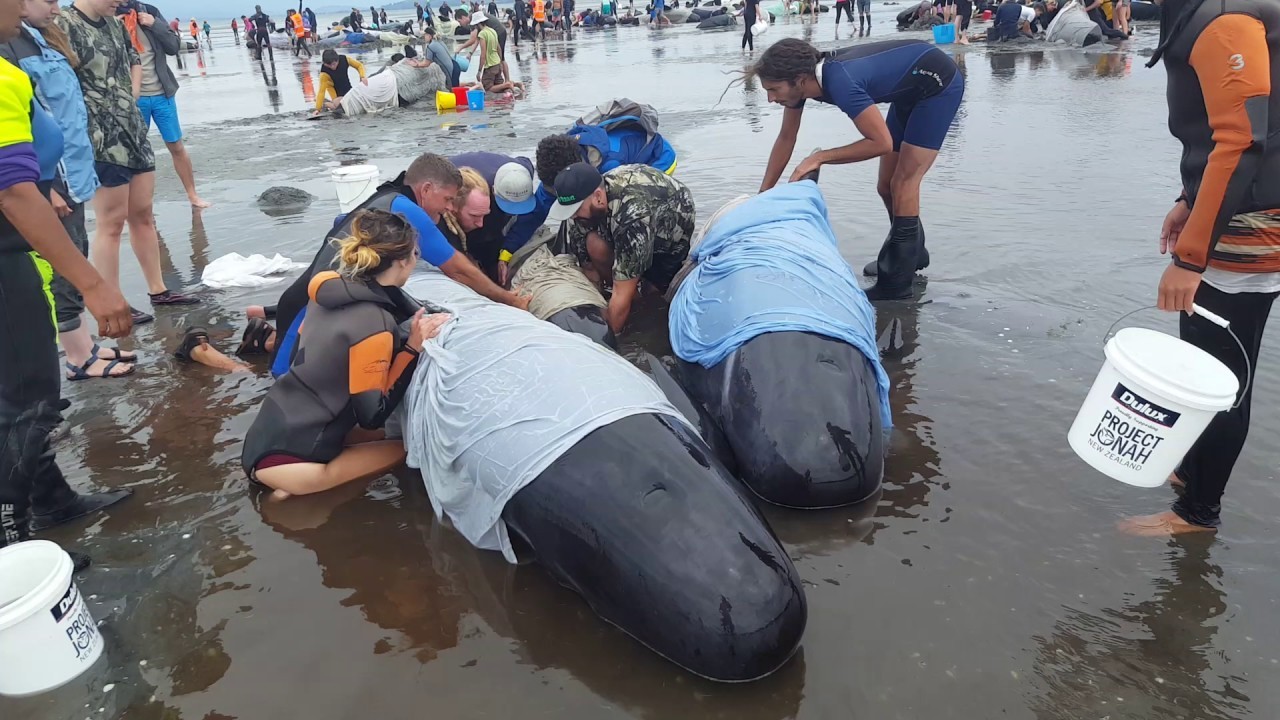
Hundreds of Pilot Whales Die in Devastating Mass Stranding in New Zealand

More than 500 volunteers flocked to a remote bay in New Zealand in response to a devastating mass stranding of pilot whales.
Around 416 pilot whales beached near the base of Farewell Spit in Golden Bay overnight, of which 250 to 300 were already dead when the whales were discovered, the Department of Conservation announced in a Feb. 10 media release.
A witness told The Washington Post that the whales were “crying and sighing” as they lay stranded on the beach.
https://twitter.com/SkyNews/status/830024603900706816
Friday’s incident was the third largest whale stranding ever recorded in New Zealand and the largest known whale stranding in the country since 1985, when 450 were stranded in Auckland, Reuters reported.
Rescuers tried to refloat the remaining cetaceans during high tide on Friday morning but only had partial success. Around 50 whales had swum out of the bay but 80 to 90 had re-stranded on the beach by the afternoon.
Andrew Lamason, Department of Conservation operations manager for Golden Bay, told The Guardian it was common for whales involved in a mass stranding to re-beach themselves because they are very social animals who like to stay in close proximity to their pod.
“We are trying to swim the whales out to sea and guide them but they don’t really take directions, they go where they want to go. Unless they get a couple of strong leaders who decide to head out to sea, the remaining whales will try and keep with their pod on the beach,” he said.
The rescue team has been pouring water over the re-stranded whales to try and keep them cool before floating them out at the next high tide. Children also sang songs to keep the creatures calm.
“I’ve never seen anything like this,” a volunteer named Petra Dubois told Stuff.co.nz. “It’s just so unbelievably sad to see all these bodies; so many lives gone and so many that might not survive. Just so devastating, I really don’t know what to say.”
Lamason explained to The Guardian that many volunteers were working around the clock in chilly temperatures and mentally traumatic conditions.
“It is cold, it’s wet and some of us have been in and out of the water for nine hours now. We can only cope with robust volunteers, not ones that are going to break down, which happens quite often,” he said.
According to RadioNZ, the effort to refloat the remaining 80 to 90 whales will resume Saturday. The whales will be kept comfortable and can survive for several days as long as they are kept cool and wet.
The cause of the stranding is unclear. However, Lamason said that the bay was prone to mass strandings due to the area’s shallow waters that can confuse the mammals’ sonar and find it difficult to get back out.
https://twitter.com/Tonylean/status/829818286573547520
New Zealand is known to have the highest rate of whale strandings in the world, according to the marine environmental organization Project Jonah.
Still, the latest event came as “a shock,” Project Jonah manager Darren Grover told Reuters.
In an interview with RadioNZ, Otago University zoologist Liz Slooten ruled out seismic blasting as a cause since the last survey in the area was done nearly a week ago. The blasting of seismic testing can potentially disorientate whales.
She added that the cause of the latest mysterious stranding may never be known.
According to Project Jonah, “strandings are complex events and there are many reasons why dolphins and whales may strand. In most cases the exact cause is unknown but any one of the following factors, or a combination of them, can be the cause.”
Pilot whales are not considered to be endangered even though they are depleted in some areas. The American Cetacean Society stated, “There are likely to be almost a million long-finned pilot whales and at least 200,000 short-finned pilot whales worldwide.”

 233k
233k  41k
41k  Subscribe
Subscribe 